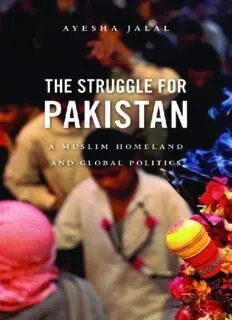
The Struggle for Pakistan: A Muslim Homeland and Global Politics PDF
Preview The Struggle for Pakistan: A Muslim Homeland and Global Politics
THE STRUGGLE FOR PAKISTAN THE STRUGGLE FOR PAKISTAN A Muslim Homeland and Global Politics Ayesha Jalal Th e Belknap Press of Harvard University Press Cambridge Massachusetts London En gland 2014 Copyright © 2014 by the President and Fellows of Harvard College All rights reserved Printed in the United States of America First printing Library of Congress Cataloging- in- Publication Data Jalal, Ayesha, author. Th e struggle for Pakistan : a Muslim homeland and global politics / Ayesha Jalal. pages cm Includes bibliographical references and index. ISBN 978-0-674-05289-5 (alkaline paper) 1. Pakistan—History. 2. Pakistan—Politics and government. 3. Civil-military relations—Pakistan. 4. Democracy—Pakistan. 5. Islam and politics—Pakistan. 6. Islam and state—Pakistan. 7. Geopolitics—Pakistan. I. Title. DS383.5.A2J338 2014 954.9104—dc23 2014006379 In memory of my father, Hamid Jalal, for supporting my spirit of historical inquiry CONTENTS Preface ix Abbreviations xi Prologue: “Speak, for Your Lips Are Free” 1 1. From Minority to Nation 10 2. Truncated State, Divided Nation 40 3. A Sprawling Military Barrack 61 4. Pitfalls of Martial Rule 98 5. Toward the Watershed of 1971 142 6. Th e Rise and Fall of Pop u lism 177 7. Martial Rule in Islamic Garb 216 8. Democracy Restored? 259 9. A Geostrategic Riddle 308 10. Entangled Endgames 345 Epilogue: Overcoming Terror 384 Notes 399 Glossary 421 Ac know ledg ments 423 Index 425 PREFACE Pakistan for me is more than just a place of origin. Ever since my formative teen years in New York City, the trials and tribulations of this self-s tyled Muslim homeland have sparked my curiosity and led me to ask questions for which there were no easy answers. As a high school student in the cos- mopolitan setting of Manhattan during the civil war in East Pakistan, I could not reconcile the narratives of Pakistan’s offi cial nationalism with daily media reports of atrocities perpetrated by the national army and its auxiliaries against the Bengali population of the eastern wing. Th e events of 1971, which ended with Pakistan’s military defeat by India and the creation of Bangladesh, demolished the most cherished truths of offi cial Pakistani nationalism and left a profound mark on my development as a historian. It was as an undergraduate at Wellesley College that understanding the causes of Pakistan’s recurrent spells of military rule and the uses made of Islam by the state to govern a federally disparate and inequitable nation- state became an intellectual preoccupation. I was in Rawalpindi for my summer holidays in 1977 when General Zia- ul- Haq overthrew the elected government of Zulfi kar Ali Bhutto and imposed martial law in Pakistan. Th e Zia regime exploited the global assertion of Islam in the wake of the 1973 Arab- Israeli war and the quadrupling of oil prices to promote “Islam- ization” and inject public displays of Islamic piety into the national cul- ture. Th e swift transformation of Pakistan in the name of Islamic ideology defi ned by an unpop u lar military dictator propelled me toward studying history, both as a methodology and as a discipline. Zia’s contention that Islam was the sole reason for the country’s creation prompted my inquiry into the partition of India that resulted in my doctoral work at the Univer- sity of Cambridge. Th is work was later published in 1985 by Cambridge
